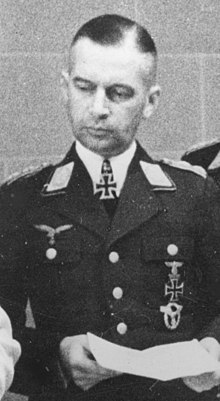Hans Jeschonnek
Hans Jeschonnek (born April 9, 1899 in Hohensalza , Posen Province ; † August 18, 1943 in Camp Robinson , East Prussia ) was Chief of Staff of the Air Force in World War II .
Life
Hans Jeschonnek was the son of the grammar school director Friedrich Jeschonnek and his wife Klara Jeschonnek, b. Sperl. His brother was the naval officer (most recently vice admiral ) and later inspector of the navy Gert Jeschonnek .
At the age of 15 he reported from the Lichterfelde Cadet Institute to the front of the First World War , where he served in the 3rd Lower Silesian Infantry Regiment No. 50 and was promoted to lieutenant in September 1914 . In the summer of 1917 he switched to the air force , with which he took part in the border battles in Upper Silesia after the end of the war.
After joining the Reichswehr , he served as a cavalry officer and finished his general staff training as the best of his year. He then worked in a department of the Reichswehr Ministry that was responsible for the secret establishment of an air force that was banned after the war. In 1933 Jeschonnek became an adjutant to the State Secretary in the Reich Aviation Ministry Erhard Milch .
In 1935 he became the Fliegergruppe Greifswald displaced and took over in October 1936 as a Commodore , the set up there Lehrgeschwader the Air Force. In 1937 Jeschonnek returned to the Reich Ministry of Aviation as head of department, where he was appointed chief of the air force command staff in February 1938 and promoted to colonel in November 1938 .
From February 1, 1939 until his death, he was Chief of Staff of the Air Force, from August 1939 as Major General . After the success of the Luftwaffe in the attack on Poland in 1939 and in the western campaign in 1940, he was promoted to General der Flieger in July 1940, skipping the rank of Lieutenant General .
In view of the Blitzkrieg concept, the air armament ultimately proved to be too tightly planned. This became evident as early as 1940 in the Battle of Britain , later in the face of high losses in the war against the Soviet Union and in the Mediterranean , where it was not possible to establish air superiority and thus secure supplies for the Africa Corps .
Before the war, Jeschonnek was the only head of the Reich Aviation Ministry to approve of Adolf Hitler's completely exaggerated air armament concept, which could not be implemented due to a lack of armaments capacities such as finances , so that Hermann Göring did not dare to propose a realistic, scaled-down program to Hitler. The armaments program that was finally implemented fell far short of Hitler's specifications.
Jeschonnek was established in early 1942 , Colonel General transported.
After the heavy air raids on Hamburg in July and August 1943, the replacement of Jeschonnek and Göring was already being discussed in the air force command. Since the failure of the air supply to the Stalingrad pocket, Hitler had been on bad terms with Göring and increasingly directed his anger against Jeschonnek at the helplessness of the Luftwaffe in the face of British-American attacks such as the Battle of the Ruhr , with Göring abandoning his chief of staff.
After the first heavy British air raid against Peenemunde (Operation Hydra) in the night from 17 to 18 August 1943 Jeschonnek committed the next morning suicide . Goering falsified the date of death to August 19 so as not to have any connection with the bombing, and certain gastric bleeding was the cause of death. Joseph Goebbels commented on this in his diary on August 20, 1943:
"Goering informs me that Colonel-General Jeschonnek suddenly died of a stomach bleeding. This gastric bleeding is of course not true. Jeschonnek shot himself, just like Udet . "
To this day, the wrong information about the date of death has occasionally been found in the literature. General Günther Korten became his successor as Chief of Staff of the Air Force .
Awards
- Iron Cross II and I Class (1914)
- Prussian military pilot badge
- Wound badge (1918) in black
- Wehrmacht service award IV. To I. class
- Clasp for the Iron Cross, 2nd and 1st class
- Knight's Cross of the Iron Cross
- Pilot and observer badges in gold with diamonds
- Romanian military order Michael the Brave III. and II. class
- Finnish freedom cross 1st class with star and swords
literature
- Gerhard Hümmelchen : Colonel General Hans Jeschonnek. In: Gerd R. Ueberschär (ed.): Hitler's military elite. Volume 1. Primus, Darmstadt 1998, ISBN 3-89678-083-2 , pp. 97-101.
Web links
- Jeschonnek, Hans . In: East German Biography (Kulturportal West-Ost)
Individual evidence
- ↑ Elke Fröhlich (ed.): The diaries of Joseph Goebbels . KG Saur, Munich, Part II: Dictations 1941–1945 . 15 vols. 1993-1996, ISBN 3-598-21920-2 . Volume 9, p. 318, August 20, 1943.
- ↑ Veit Scherzer : Knight's Cross bearers 1939-1945. The holders of the Iron Cross of the Army, Air Force, Navy, Waffen-SS, Volkssturm and armed forces allied with Germany according to the documents of the Federal Archives. 2nd Edition. Scherzers Militaer-Verlag, Ranis / Jena 2007, ISBN 978-3-938845-17-2 , p. 421
| personal data | |
|---|---|
| SURNAME | Jeschonnek, Hans |
| BRIEF DESCRIPTION | Chief of Staff of the Air Force and Colonel General |
| DATE OF BIRTH | April 9, 1899 |
| PLACE OF BIRTH | Hohensalza |
| DATE OF DEATH | August 18, 1943 |
| Place of death | Robinson camp , East Prussia |



